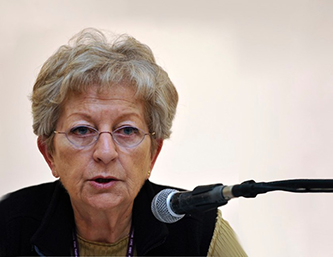One in a series of events in "Eccentric Subjects: A Symposium in Honor of Teresa de Lauretis," presented by Swarthmore College Film & Media Studies.
Cosponsored by Penn Cinema Studies, Department of English, Slought, Alice Paul Center for Research on Gender, Sexuality and Women, and Penn Humanities Forum.
What exactly is the sexual drive? Is it an inborn “polymorphous perversity,” as Freud believed? Or is it acquired – an effect of seduction, repression, and translation, as one of Freud’s recent interpreters, Jean Laplanche, has argued? Teresa de Lauretis, whose work on gender, sexuality, and the cinema has had worldwide impact, turns her attention to this fundamental question about human sexuality. Please see Slought for more information.
Teresa de Lauretis is Professor Emerita of the History of Consciousness at the University of California, Santa Cruz. Born in Italy, de Lauretis received her PhD in Modern Languages and Literatures at Bocconi University in Milan. She has held professorships at schools throughout the United States and visiting professorships all over the world, teaching Italian language and literature, semiotics, feminist studies, and film studies.
De Lauretis is the author of ten books, and over one hundred scholarly articles. Her books have been translated into many languages. Her most recent book, Freud’s Drive, argues for the renewed relevance of the Freudian theory of drives through a variety of works ranging from cinema and literature to metapsychology and cultural theory. She is also the author of Technologies of Gender: Essays on Theory, Film, and Fiction; Alice Doesn’t: Feminism, Semiotics, Cinema; and The Practice of Love: Lesbian Sexuality and Perverse Desire. She also edited Queer Theory: Lesbian and Gay Sexualities a special issue of special issue of differences: A Journal of Feminist Cultural Studies.
She has received a number of honorary doctorates and has held several fellowships, including ones at The Humanities Institute, SUNY Stony Brook; the Center for Twentieth Century Studies, University of Wisconsin, Milwaukee; the Centro di Studi Italo-Americani, Rome, Italy; and the Institute for the Humanities, University of Michigan, Ann Arbor.



